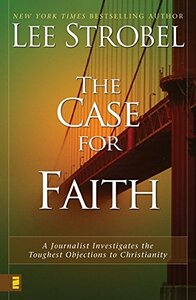Take a photo of a barcode or cover
62 reviews for:
The Case for Faith: A Journalist Investigates the Toughest Objections to Christianity
Lee Strobel
62 reviews for:
The Case for Faith: A Journalist Investigates the Toughest Objections to Christianity
Lee Strobel
This book was really interesting even though I didn't agree with everything. First of all, I must admit I was quite disappointed by the chapter about Hell which, in my opinion, left out some important details and arguments. I was surprised that the word "holiness" has not been mentioned even once. That's something I understood along the way as my relationship with God grew: it's not that God won't let you be in his presence, it's that He CAN'T do such a thing because his holiness doesn't allow him in any way to coexist with sin. THAT'S the reason why we desperately need Jesus and his justification through his sacrifice on the cross and his resurrection (which is how Jesus conquered death, the wages of our sin and how we can also conquer it through a genuine faith in Him). I was also bothered by the topic of suffering that has not been covered satisfactorily. Why these two subjects specifically? Because they're the ones that still bothered Lee Strobel at the end of his book.
However, despite what I just pointed out, there were many enlightening facts and touching events and testimonies. I would gladly recommend it to a Christian or spiritual seeker going through a doubting phase and even a convinced Christian who needs some tools to defend his or her faith (since the experts in this book are answering the eight toughest questions that are challenging Christianity).
However, despite what I just pointed out, there were many enlightening facts and touching events and testimonies. I would gladly recommend it to a Christian or spiritual seeker going through a doubting phase and even a convinced Christian who needs some tools to defend his or her faith (since the experts in this book are answering the eight toughest questions that are challenging Christianity).
I read this specifically at the request of a friend of mine who mostly wanted to see if I could finish it before I threw it at him out of sheer frustration.
I guess I should start by stating that I disagree with Strobel on just about every single one of his points in this book. But I did read it, and it certainly made me take a second look at what I know and how it affects the things that I don't believe in. I didn't change my mind, of course, but anything that forces me to think about things in a new way is a good thing.
I only gave serious consideration to tossing the book during one of the later chapters that asked the question of how Christians could have faith in a god that would send people to hell. I've returned the book to my friend now, so I can't give the exact quote, but the scholar Strobel was interviewing said, in all seriousness, "Well, you have to understand that when we die and are in heaven or hell, we'll be our adult selves, even if we die as children." ... and then continues on with his "God knows all, so if he says people should burn in hell, well, they're going to burn in hell", and never even does me the courtesy of at least quoting a Bible verse or something to show where he pulled that particular factoid from.
Which basically comes down to the reason I don't bother to get into religious arguments: a person of the Christian faith who believes that the Bible is the word of God will use the Bible as proof. As someone who is not of the Christian faith, I will respond "so?" and the debate can never go anywhere.
I would have accepted a vague passage from the Bible as the scholar's grounds for believing that children don't actually go to hell because apparently everyone is an adult after they die - but he simply stated it as fact (the implied "duh" at the end was silent but present).
I'm glad I read it - it was insight into the faith that a lot of people in this country are struggling for and with - but I didn't find Strobel's case to have much basis.
I guess I should start by stating that I disagree with Strobel on just about every single one of his points in this book. But I did read it, and it certainly made me take a second look at what I know and how it affects the things that I don't believe in. I didn't change my mind, of course, but anything that forces me to think about things in a new way is a good thing.
I only gave serious consideration to tossing the book during one of the later chapters that asked the question of how Christians could have faith in a god that would send people to hell. I've returned the book to my friend now, so I can't give the exact quote, but the scholar Strobel was interviewing said, in all seriousness, "Well, you have to understand that when we die and are in heaven or hell, we'll be our adult selves, even if we die as children." ... and then continues on with his "God knows all, so if he says people should burn in hell, well, they're going to burn in hell", and never even does me the courtesy of at least quoting a Bible verse or something to show where he pulled that particular factoid from.
Which basically comes down to the reason I don't bother to get into religious arguments: a person of the Christian faith who believes that the Bible is the word of God will use the Bible as proof. As someone who is not of the Christian faith, I will respond "so?" and the debate can never go anywhere.
I would have accepted a vague passage from the Bible as the scholar's grounds for believing that children don't actually go to hell because apparently everyone is an adult after they die - but he simply stated it as fact (the implied "duh" at the end was silent but present).
I'm glad I read it - it was insight into the faith that a lot of people in this country are struggling for and with - but I didn't find Strobel's case to have much basis.

